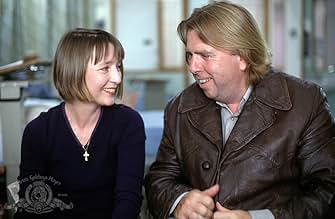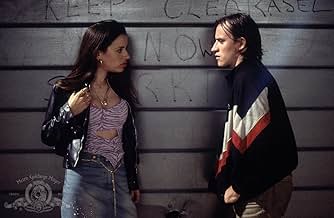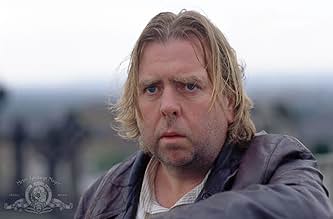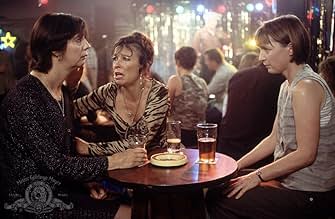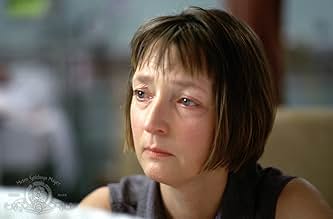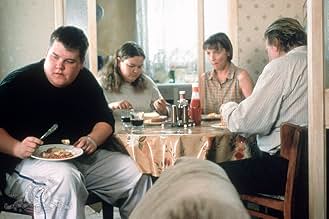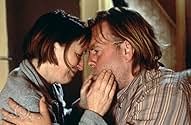PUNTUACIÓN EN IMDb
7,5/10
12 mil
TU PUNTUACIÓN
Añade un argumento en tu idiomaIn a poor working class London home, Penny's love for her partner, taxi driver Phil, has run dry. When an unexpected tragedy occurs, they and their local community are brought back together.In a poor working class London home, Penny's love for her partner, taxi driver Phil, has run dry. When an unexpected tragedy occurs, they and their local community are brought back together.In a poor working class London home, Penny's love for her partner, taxi driver Phil, has run dry. When an unexpected tragedy occurs, they and their local community are brought back together.
- Premios
- 3 premios y 13 nominaciones en total
Reseñas destacadas
I have just returned from a special advance showing of "All Or Nothing" at my local UGC and I must say, this film exceeded my expectations enormously.
The film is about the lives of one family in a council estate and how each member interacts with the community. The Father, Phil Bassett (Timothy Spall) works as a Taxi driver while his wife Penny (Lesley Manville) is a checkout operator at a local supermarket. They are unmarried but have two children Rachel and Rory, the former being an angst-ridden, overweight layabout who is key to the film.
Acting is superb. It is that simple. All but one performance is utterly convincing, especially Timothy Spall with his constant bemused grimace which sets the mood of both his character and the film. The one exception is Donna played by Helen Coker. Her role is played up too much and seems rather forced. Now if by any chance you're reading Helen, please don't be disheartened; I merely saw you as the "least best" of an excellent bunch and I have to criticise something!
The script is authentic, witty and full of emotion while not being repetitive (barring the word "alright"!).
"All Or Nothing" is one of the greatest portrayals of what it is REALLY like to be part of a down-on-your-luck working class family. I even believe the film ended too soon; there were a few ideas that could have been developed further. I mention this not as a criticism but as a tribute to Mike Leigh who actually made we wish this 2hr 28 minute film would go on!
Fantastic! Eight out of ten!!!
The film is about the lives of one family in a council estate and how each member interacts with the community. The Father, Phil Bassett (Timothy Spall) works as a Taxi driver while his wife Penny (Lesley Manville) is a checkout operator at a local supermarket. They are unmarried but have two children Rachel and Rory, the former being an angst-ridden, overweight layabout who is key to the film.
Acting is superb. It is that simple. All but one performance is utterly convincing, especially Timothy Spall with his constant bemused grimace which sets the mood of both his character and the film. The one exception is Donna played by Helen Coker. Her role is played up too much and seems rather forced. Now if by any chance you're reading Helen, please don't be disheartened; I merely saw you as the "least best" of an excellent bunch and I have to criticise something!
The script is authentic, witty and full of emotion while not being repetitive (barring the word "alright"!).
"All Or Nothing" is one of the greatest portrayals of what it is REALLY like to be part of a down-on-your-luck working class family. I even believe the film ended too soon; there were a few ideas that could have been developed further. I mention this not as a criticism but as a tribute to Mike Leigh who actually made we wish this 2hr 28 minute film would go on!
Fantastic! Eight out of ten!!!
The previous reviewers describe the story's chemistry adequately. But why all or nothing?
Contrary to the other comments I did not find the protrayal dreary or depressing. To do so seems to me to show a lack of awareness of the people who live and work near us or for us; who breathe the same air we do.
These people don't live in a slum or a housing development. They live in their homes. They do not portray, as in too many other movies, special effects empty violence or emotionless skin sex scenes. They beg us to consider and respect the lives they really live and their search for the fuel to continue tomorrow. They don't need everything; they don't need it all. They simple need enough to enable their emotional existence, that's all; otherwise they have nothing.
"All or Nothing" finally arrived in Honolulu where there are people with dialects different from London and yet have the very same vacancies in their lives.
I vote to clone Director Mike Leigh!!
Contrary to the other comments I did not find the protrayal dreary or depressing. To do so seems to me to show a lack of awareness of the people who live and work near us or for us; who breathe the same air we do.
These people don't live in a slum or a housing development. They live in their homes. They do not portray, as in too many other movies, special effects empty violence or emotionless skin sex scenes. They beg us to consider and respect the lives they really live and their search for the fuel to continue tomorrow. They don't need everything; they don't need it all. They simple need enough to enable their emotional existence, that's all; otherwise they have nothing.
"All or Nothing" finally arrived in Honolulu where there are people with dialects different from London and yet have the very same vacancies in their lives.
I vote to clone Director Mike Leigh!!
Lets be honest, Mike Leigh's films are not for everyone. No effort is made to make them commercially viable, the cast are almost always, largely unknown and certain scenes are so harrowing that even the strongest viewer can find themselves distressed and perturbed. While these factors keep some people away, they also keep many others coming back time and time again. Mike Leigh is quite simply, a national treasure. And I don't mean that in the same fluffy "Gawd Bless 'Em" manner that people applied to Thora Hird and the Queen Mother. I mean that he is simply one of the finest and most honest chroniclers of contemporary Britain that we have produced.
Make no mistake, the British have always enjoyed social realism. We can gauge that through that great yardstick of social self-perceptions, the soap opera. While the Americans produce soaps full of tanned, successful oil barons and their supermodel / actress mistresses, and the Australians show us their blue collar bungalow owners who like a beer with their mates and a barbecue on Sundays, the British make soaps full of characters who are little more than diluted, softened incarnations of Leigh's own subjects. People who work at checkouts and in launderettes, people who are trapped by poverty, alcoholism, violence and stifled or strangled ambition.
But through it all , there's a hope, an anticipation of a better day just around the corner and that's what makes these films ultimately uplifting. Leigh has always shown that no matter how dire the circumstances, how forlorn the existence, love and hope, friendship and family, will find a way to offer support, comfort and succor.
In achieving this, Leigh has the assistance of another of the U.K.'s finest - Timothy Spall. If ever an actor was capable of portraying at once the fragility, insecurity and yet the potential for sheer stubborn strength of the British psyche its Spall. His character in All or Nothing, Phil is an incredibly vulnerable man. A pensive, gentle man, trapped in his own doubts and in a world of people who react by lashing out, verbally or physically and so compounding his doubts and fear. He apologises constantly, and often appears to be apologising for simply existing. An under-educated but intellectual man he even apologises for having an extensive vocabulary, a character trait which Leigh uses cleverly but subtly by having Phil precede each "big word" with "wotsitsname". It appears that Phil is searching for the word, he isn't, he knows exactly what he's about to say but is reluctant to say it in case he appears educated or articulate. We hear Phil talk about destiny and saying "It's...wotsitsname..kismet". In a world of expletives and harsh words he's ashamed at his verbal dexterity viewing it as a weakness rather than a strength.
Devices such as these help us understand technically why Leigh is just such a good writer and the way in which these devices are performed help us understand why Leigh constantly looks to Spall to anchor his scripts with his marvelous humanity.
All or Nothing is a vicious, gut wrenching, graceful, uplifting gem of a movie from a master filmmaker. Its is performed by a marvelous leading man and a collection of wonderfully talented supporting actors. In a world of blockbusters and multi million dollar opening nights Mike Leigh continues to give us humanity, despair, courage and beauty. And do we ever need him.
Make no mistake, the British have always enjoyed social realism. We can gauge that through that great yardstick of social self-perceptions, the soap opera. While the Americans produce soaps full of tanned, successful oil barons and their supermodel / actress mistresses, and the Australians show us their blue collar bungalow owners who like a beer with their mates and a barbecue on Sundays, the British make soaps full of characters who are little more than diluted, softened incarnations of Leigh's own subjects. People who work at checkouts and in launderettes, people who are trapped by poverty, alcoholism, violence and stifled or strangled ambition.
But through it all , there's a hope, an anticipation of a better day just around the corner and that's what makes these films ultimately uplifting. Leigh has always shown that no matter how dire the circumstances, how forlorn the existence, love and hope, friendship and family, will find a way to offer support, comfort and succor.
In achieving this, Leigh has the assistance of another of the U.K.'s finest - Timothy Spall. If ever an actor was capable of portraying at once the fragility, insecurity and yet the potential for sheer stubborn strength of the British psyche its Spall. His character in All or Nothing, Phil is an incredibly vulnerable man. A pensive, gentle man, trapped in his own doubts and in a world of people who react by lashing out, verbally or physically and so compounding his doubts and fear. He apologises constantly, and often appears to be apologising for simply existing. An under-educated but intellectual man he even apologises for having an extensive vocabulary, a character trait which Leigh uses cleverly but subtly by having Phil precede each "big word" with "wotsitsname". It appears that Phil is searching for the word, he isn't, he knows exactly what he's about to say but is reluctant to say it in case he appears educated or articulate. We hear Phil talk about destiny and saying "It's...wotsitsname..kismet". In a world of expletives and harsh words he's ashamed at his verbal dexterity viewing it as a weakness rather than a strength.
Devices such as these help us understand technically why Leigh is just such a good writer and the way in which these devices are performed help us understand why Leigh constantly looks to Spall to anchor his scripts with his marvelous humanity.
All or Nothing is a vicious, gut wrenching, graceful, uplifting gem of a movie from a master filmmaker. Its is performed by a marvelous leading man and a collection of wonderfully talented supporting actors. In a world of blockbusters and multi million dollar opening nights Mike Leigh continues to give us humanity, despair, courage and beauty. And do we ever need him.
Phil (Timothy Spall) is an overweight taxi driver who gets up late in the day and works intermittently, barely communicating with his family except for a few grunts. His philosophy of life is expressed as "We're all born alone. We die alone. There's nothing we can do about it". Mike Leigh has given us powerful portrayals of the underclass in his previous films Naked, Secrets and Lies, and Life is Sweet but none more powerful and moving than his latest, All or Nothing.
In this film, Leigh looks at three families living in a dreary South London housing complex and captures their lives with an intimacy that is almost unbearable. All or Nothing has a documentary feel, almost as if the camera was just planted in the middle of the living room to observe. The conditions are familiar: unemployment and underemployment, alcoholism, teen pregnancy, isolation, and the inevitable loss of self-esteem and despair. It is, however, more than a drama of oppressive social conditions, but also of lack of communication between people who desperately need love but are too afraid or lethargic to ask for it.
Spall's performance is a revelation. His unshaven face, disheveled hair, and hangdog expression communicate deep resignation. The film is bleak but Leigh mixes its heartbreak with joy. When a neighbor Maureen (Ruth Sheen) sings ''Don't It Make My Brown Eyes Blue,'' at a karaoke bar, her eyes shine with a glow that seems at odds with the rest of her life but is so contagious that even her most dispirited friends take notice.
It is obvious, from the start that something is amiss. Phil says nothing when his obese son Rory (James Cordon) hurls words of abuse at his common-law wife Penny. Rory is an overweight bully who does nothing but lay around the house, watching TV and hurl insults at everyone in his path. Sister Rachel (Alison Garland) has a job cleaning up at a nursing home but also seems to be going through the motions of living except when she is interacting with patients. Penny works in a supermarket and does just about everything to keep the family going, but it never seems to be enough. The film's sub-plots add to the feeling of life reeling out of control, but none of these are fully developed and are just dropped without tying up the loose ends. Maureen's teenage daughter is pregnant by some lout that doesn't give two hoots about her. Another resident, unemployed Samantha (Sally Hawkins) hates her parents and finds herself seducing a very strange young man (Ben Crompton) lurking in the shadows of the complex grounds.
The second half of the film concentrates mainly on Phil and his family. When a medical emergency occurs, the family begins to open up and express long buried feelings of hurt and resentment. The final confrontation between Phil and Penny achieves an explosive power. Phil tells Penny that when he's had enough, he just switches off the meter on his taxi. Penny responds that she doesn't have the luxury of turning off a switch and making everything go away, that she is still responsible for the daily chores and the condition of the family. After Phil finally reveals his deepest fears, a transformation occurs that is unmistakably reflected in the family's facial expressions and body language.
Leigh does not offer simple solutions, but seems to be telling us that although life is painful, we can reach beyond the pain to get in touch with the beauty. He shows us that love is the glue that holds families together and that either there is love or there's nothing. As a result, All or Nothing pulsates with a humanity that, in spite of its bleakness, is life affirming and ultimately uplifting, reminding us that beyond bitterness, there is love, and beyond suffering, there is grace.
In this film, Leigh looks at three families living in a dreary South London housing complex and captures their lives with an intimacy that is almost unbearable. All or Nothing has a documentary feel, almost as if the camera was just planted in the middle of the living room to observe. The conditions are familiar: unemployment and underemployment, alcoholism, teen pregnancy, isolation, and the inevitable loss of self-esteem and despair. It is, however, more than a drama of oppressive social conditions, but also of lack of communication between people who desperately need love but are too afraid or lethargic to ask for it.
Spall's performance is a revelation. His unshaven face, disheveled hair, and hangdog expression communicate deep resignation. The film is bleak but Leigh mixes its heartbreak with joy. When a neighbor Maureen (Ruth Sheen) sings ''Don't It Make My Brown Eyes Blue,'' at a karaoke bar, her eyes shine with a glow that seems at odds with the rest of her life but is so contagious that even her most dispirited friends take notice.
It is obvious, from the start that something is amiss. Phil says nothing when his obese son Rory (James Cordon) hurls words of abuse at his common-law wife Penny. Rory is an overweight bully who does nothing but lay around the house, watching TV and hurl insults at everyone in his path. Sister Rachel (Alison Garland) has a job cleaning up at a nursing home but also seems to be going through the motions of living except when she is interacting with patients. Penny works in a supermarket and does just about everything to keep the family going, but it never seems to be enough. The film's sub-plots add to the feeling of life reeling out of control, but none of these are fully developed and are just dropped without tying up the loose ends. Maureen's teenage daughter is pregnant by some lout that doesn't give two hoots about her. Another resident, unemployed Samantha (Sally Hawkins) hates her parents and finds herself seducing a very strange young man (Ben Crompton) lurking in the shadows of the complex grounds.
The second half of the film concentrates mainly on Phil and his family. When a medical emergency occurs, the family begins to open up and express long buried feelings of hurt and resentment. The final confrontation between Phil and Penny achieves an explosive power. Phil tells Penny that when he's had enough, he just switches off the meter on his taxi. Penny responds that she doesn't have the luxury of turning off a switch and making everything go away, that she is still responsible for the daily chores and the condition of the family. After Phil finally reveals his deepest fears, a transformation occurs that is unmistakably reflected in the family's facial expressions and body language.
Leigh does not offer simple solutions, but seems to be telling us that although life is painful, we can reach beyond the pain to get in touch with the beauty. He shows us that love is the glue that holds families together and that either there is love or there's nothing. As a result, All or Nothing pulsates with a humanity that, in spite of its bleakness, is life affirming and ultimately uplifting, reminding us that beyond bitterness, there is love, and beyond suffering, there is grace.
This film is worth a hundred others because it is not an exercise in making a product and marketing it successfully- instead it is a statement by a man who is a true director, someone who feels passionately about the world we live in, and uses this fantastic medium to its highest potential.
The film is ultimately about a man (Phil, Timothy Spall) who has philosophized about life to the point where nothing matters to him anymore. The only thing that brings him back around the world of the living is (the only thing any of us really need for happiness)... Love.
For me, that is one of the most pertinent and beautiful things that someone with a voice in society can say.
P.S. It is highly likely that if anyone found this film 'too depressing' than they are not really primed to expect anything other than the beauty and predictability of
hollywood film. And in response to the chap who refutes the existence of such misery in the real world: you are obviously a lucky, privileged chap.
The film is ultimately about a man (Phil, Timothy Spall) who has philosophized about life to the point where nothing matters to him anymore. The only thing that brings him back around the world of the living is (the only thing any of us really need for happiness)... Love.
For me, that is one of the most pertinent and beautiful things that someone with a voice in society can say.
P.S. It is highly likely that if anyone found this film 'too depressing' than they are not really primed to expect anything other than the beauty and predictability of
hollywood film. And in response to the chap who refutes the existence of such misery in the real world: you are obviously a lucky, privileged chap.
¿Sabías que...?
- CuriosidadesFirst cinema feature of Sally Hawkins.
- ConexionesFeatured in The South Bank Show: Mike Leigh (2002)
Selecciones populares
Inicia sesión para calificar y añadir a tu lista para recibir recomendaciones personalizadas
- How long is All or Nothing?Con tecnología de Alexa
Detalles
- Fecha de lanzamiento
- Países de origen
- Idiomas
- Títulos en diferentes países
- All or Nothing
- Localizaciones del rodaje
- Empresas productoras
- Ver más compañías en los créditos en IMDbPro
Taquilla
- Presupuesto
- 9.000.000 US$ (estimación)
- Recaudación en Estados Unidos y Canadá
- 201.546 US$
- Fin de semana de estreno en EE. UU. y Canadá
- 25.890 US$
- 27 oct 2002
- Recaudación en todo el mundo
- 2.847.049 US$
- Duración2 horas 8 minutos
- Color
- Mezcla de sonido
- Relación de aspecto
- 1.85 : 1
Contribuir a esta página
Sugerir un cambio o añadir el contenido que falta

